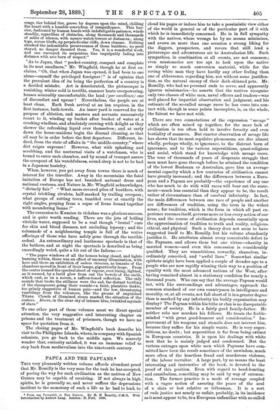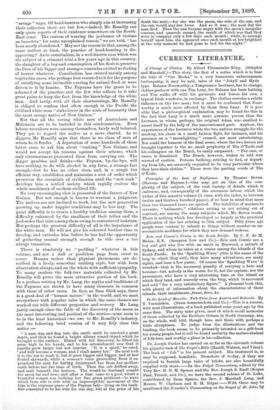PAPUA AND 'Dill PAPUANS.*
Tars very pleasantly written volume affords abundant proof that Mr. Romilly is the very man for the task he has accepted, of paving the way for such civilisation as the natives of New Guinea may be capable of receiving. If not always in high spirits, he is generally so, and never suffers the depressions incident to the monotony of such a life as he had to lead, to * From my Verandah in New Guinea. By H. H. C.M.G. With
Introduction by Andrew Lang. London : D. Hutt. 1888.
cloud his pages or induce him to take a pessimistic view either of the world in general or of the particular part of it with which he is immediately concerned. He is in full sympathy with the natives, whose wrongs he by no means minimises, and avows on more than one occasion a strong liking for the diggers, prospecters, and rovers that still lend a picturesque and adventurous air to Australasian life. Such sympathies, in combination at all events, are not common ; even missionaries are too apt to look upon the native as simply so much conversion material, while for the roving white man they have hardly any other feeling than one of abhorrence, regarding him, not without some justifica- tion, as the natural enemy of their dark-skinned pets. Mr. Homily, who had no personal ends to serve, and apparently ignores missionaries—he asserts that the natives recognise only two classes of white men, naval officers and traders—was well placed for impartial observation and judgment, and his estimate of the so-called savage races he has come into con- tact with, though in some points incomplete, is, on the whole, the fairest we have met with.
There are two connotations of the expression " savage " which are often mixed up together, for the mere lack of civilisation is too often held to involve ferocity and even bestiality of manners. But exacter observation of savage life has shown that its most repulsive phenomena are due almost wholly, perhaps wholly, to ignorance, to the distrust born of ignorance, and to the various superstitions, quasi-religious and social, which stand for knowledge with savage races. The tens of thousands of years of desperate struggle that man must have gone through before he attained the condition of the lowest Bushman or Australian, gave him an average mental capacity which a few centuries of civilisation cannot have greatly increased ; and the differences between a Euro- pean and a Papuan are probably—the experience of any one who has much to do with wild races will bear out the state- ment—much less essential than they appear to be, the result rather of circumstance than of cerebral inferiority. In fact, the main differences between one race of people and another are differences of tradition, using the term in the widest sense ; for tradition, which is the form in which all past ex- perience resumes itself, governs more or less every action of our lives, and the coarse of civilisation depends essentially upon the approximation of tradition to truth and reality, religious, ethical, and physical. Such a theory does not seem to have suggested itself to Mr. Romilly, but his volume abundantly justifies it. He attributes almost every conceivable defect to the Papuans, and allows them but one virtue—chastity in married women—and even this concession is considerably qualified. They are unambitious, cowardly, shameless, in. ordinately conceited, and "awful liars." Somewhat similar epithets might have been applied a couple of decades ago to a people who are now rapidly winning their way to a position of equality with the most advanced nations of the West, after having remained almost in a stationary condition for nearly a, thousand years. Who can say that the average Papuan would not, with like surroundings and advantages, approach the common standard of our own countrymen in intelligence and morality, or, at all events, not fall short of it in a greater degree than is marked by any inferiority his bodily organisation may display? The Papuan within his tribe or clan is no disreputable member of society. He is a fairly good family-father. He neither robs nor murders his fellows. He treats the feeble- minded "with great good-humour and consideration." Im- provement of his weapons and utensils does not interest him, because they suffice for his simple wants. He is very super- stitious, no doubt ; but superstition is far from being extinct in European countries. It is upon his dealings with white men that he is mainly judged and condemned. But the various outrages upon white men which Papuans have com- mitted have been the result sometimes of the unwisdom, much more often of the heartless fraud and murderous violence, of the labour recruiter. A large part, by no means the least interesting and instructive of the book, is devoted to the proof of this position. Even with regard to head-hunting and cannibalism, something may be said by way of extenua- tion. The former practice is a mode of revenge coupled with a vague notion of assuring the peace of the soul of a slain or lost relative or tribesman. It is a sort of rade justice not nearly so unfair, probably, in its incidence as it must appear to be, to a European unfamiliar with so-called
"savage " ways. Of head-hunters who simply aim at increasing their collection there are bat few,—indeed, Mr. Homily can
only quote reports of their existence somewhere on the South- East coast. The custom of wearing the jawbones of victims as bracelets," for some unexplained reason," we are told, "has been nearly abandoned." May not the reason be that, among the
coast natives at least, the practice of head-hunting is dis- appearing ? As to cannibalism, in a well-known case which was the subject of a criminal trial a few years ago in this country, the slaughter of a boy and consumption of his flesh to preserve the lives of his bigger and stronger comrades excited no feeling of horror whatever. Cannibalism has existed mainly among vegetarian races, who perhaps first resorted to it for the purpose of satisfying some invincible craving for animal food or were driven to it by famine. The Papuans have the grace to be ashamed of the practice, and the few who adhere to it take great pains to keep the fact from the knowledge of the white man. And lastly, with all their shortcomings, Mr. Hominy is obliged to confess that often enough in the Pacific the civilised white man " sinks lower in the scale of humanity than the most savage native of New Guinea."
Not that all the roving white men of Australasia and Melanesia are to be included in this condemnation. Even labour recruiters were, among themselves, fairly well behaved.
They got to• regard the native as a mere chattel; As to diggers, Mr. Romilly says that there is no class of men of whom be is fonder. A deputation of some hundreds of these latter came to ask him about " rushing " New Guinea, and would not accept his reasons against their scheme, which only circumstances prevented them from carrying out. The digger gambles and drinks—the Papuan, by-the-bye, will have nothing to do with alcohol in any form, a strange fact enough—but he has no other vices, and, in a rough but efficient way, establishes and maintains a sort of order which preserves the essentials of civilisation until the "new rush" develops into a settled society which rapidly evolves the whole machinery of modern civilised life.
No very encouraging view is presented of the future of New Guinea. But not enough is known to warrant a judgment.
The natives are not inclined to work, but the new generation growing up under happier conditions may be less lazy. The great difficulty is to create a healthy tradition among them, a
difficulty enhanced by the smallness of their tribes and the jealousies that exist among them owing to centuries of isolation. But perhaps the greatest difficulty of all is the impatience of the white man. He will not give his coloured brother time to develop, and extrudes him before he has had the opportunity
of gathering mental strength enough to tide over a- too abrupt transition.
There is absolutely no " padding " whatever in this volume, and not a dull or profitless page from cover to cover. Human rather than physical phenomena are de- scribed in a lively, somewhat rattling style, but with keen observation always, and on the whole with sufficient sympathy. To many readers the folk-lore materials collected by Mr.
Homily will prove the most attractive portion of his book.
In a preface written by Mr. Lang, the myths and traditions of the Papuans are shown to have many elements in common
with those of other races. In fact, as Sam Slick says, there is a good deal of "human nature" in the world, and we meet everywhere with popular tales in which the same themes are worked out with different properties and scenery. Mr. Lang justly enough cites the fable of the discovery of the moon as the most interesting and poetical of the stories—none seem to be in the least historical—we owe to Mr. Homily's industry, and the following brief version of it may fitly close this notice :- " A man dug and dug into the earth until he reached a great depth, and then he found a bright silvery round object which he brought to the surface. Elated with his discovery, he lifted his prize high in his hands, and to his astonishment saw that it rapidly grew larger but not heavier. It is a spirit,' he cried, `and will become a woman, and I shall marry her.' He next took it to the sea to wash it, but it grew bigger and bigger, and at last floated skywards, while a woman's voice proceeding from it re- proached the man for having disinterred her from her mother- earth before her due time of birth. Then the orb drifted away, and sank beneath the horizon. The would-be husband sought the moon far and near, and after a time came to a pool, where a beautiful woman was bathing, her fine grass petticoat—to wave which from side to side with an imperceptible movement of the hips is the supreme grace of the Papuan lady—lying on the bank. She consented to be his wife for one day, but at the price of his death the next,—for she was the moon, the wife of the sun, and the sun would slay her lover. And so it was ; the next day the man died. Then the sun became angry with the moon's irregular courses, and quarrels ensued, the result of which was that they were in company only a few days each month ; while, to revenge herself upon him, she appeared once each month at her brightest at the very moment he had gone to bed for the night."







































 Previous page
Previous page